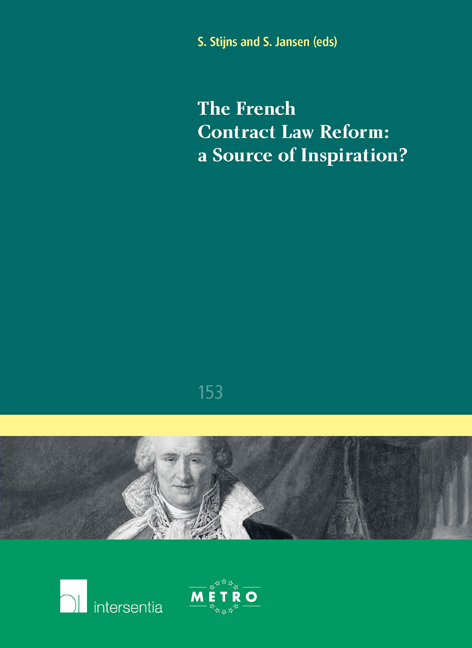Book contents
- Frontmatter
- Contents
- Introduction
- The Reform of the French Law of Obligations: How Long will the Belgians Remain Napoleon's Most Loyal Subjects?
- Pre-Contractual Phase: Reflections on the Attractiveness of the New French Rules for the Parties to International Commercial Transactions
- Nullity in the Ordonnance
- A Tale of Novelty and Continuity: Exploring the Future Judicial Control of Employment Contracts in the French Contract Law Reform
- Introducing Imprévision into French Contract Law - A Paradigm Shift in Comparative Perspective
- Commercial Impracticability and the Missed Opportunity of the French Contract Law Reform: Doctrinal, Historical and Law and Economics Arguments - Comment on Lutzi's Introducing Imprévision into French Contract Law
- Price Reduction under the French Contract Law Reform
- The Measure of Damages in the French Contract Law Reform - Lessons from far more Inspiring Systems
- Set-off in the French Reform of the Law of Obligations: a Tale of Missed Opportunities?
- Fundamental Rights in the French Contract Law Reform
- Miscellaneous Endmatter
Nullity in the Ordonnance
Published online by Cambridge University Press: 15 December 2017
- Frontmatter
- Contents
- Introduction
- The Reform of the French Law of Obligations: How Long will the Belgians Remain Napoleon's Most Loyal Subjects?
- Pre-Contractual Phase: Reflections on the Attractiveness of the New French Rules for the Parties to International Commercial Transactions
- Nullity in the Ordonnance
- A Tale of Novelty and Continuity: Exploring the Future Judicial Control of Employment Contracts in the French Contract Law Reform
- Introducing Imprévision into French Contract Law - A Paradigm Shift in Comparative Perspective
- Commercial Impracticability and the Missed Opportunity of the French Contract Law Reform: Doctrinal, Historical and Law and Economics Arguments - Comment on Lutzi's Introducing Imprévision into French Contract Law
- Price Reduction under the French Contract Law Reform
- The Measure of Damages in the French Contract Law Reform - Lessons from far more Inspiring Systems
- Set-off in the French Reform of the Law of Obligations: a Tale of Missed Opportunities?
- Fundamental Rights in the French Contract Law Reform
- Miscellaneous Endmatter
Summary
Introduction
For the past two centuries, French legal doctrine has tried to elaborate a comprehensive theory of nullity to remedy the absence of such a framework in the Code civil. Due to the variety of sources in the Ancien Regime, the rules regarding nullity formed an intricate whole prior to the enactment of the Code civil. Still largely inspired by those rules, the Code civil did not attempt to clarify the situation. Up until now, both in France and in Belgium, the doctrine of nullity is regarded as one of the most obscure and impenetrable theories in private law. Notwithstanding an unremitting interest in the matter, scholarship has not sufficiently demystified the concept of nullity and the way it operates in private law. The announced revision of large parts of the Code civil offers a unique chance to elucidate the matter at hand and to boldly go where the Code civil has not gone before.
This paper will scrutinise whether the ordonnance has indeed seized the opportunity. First, this paper will give a brief overview of the ordonnance's approach to nullity (2). Since the different aspects of nullity are too multifarious to deal with in a single paper, the scope of the research will be limited to the concept of nullity (3), its use (4), and its enforcement (5) in the ordonnance. As a consequence, the grounds of invalidity and the consequences of nullity (such as restitutions and potential liability connected to avoidance) will not be examined. Since the Draft Common Frame of Reference (DCFR) and the Dutch Burgerlijk Wetboek of 1992 have reconsidered the analysis of nullity, the ordonnance's propositions will be compared to those solutions in order to see whether the ordonnance offers state-of-the-art solutions. The results of those comparisons will demonstrate to what extent the ordonnance can be a source of inspiration for the further development of the Belgian and Dutch law regarding nullity.
- Type
- Chapter
- Information
- The French Contract Law Reform: a Source of Inspiration? , pp. 49 - 72Publisher: IntersentiaPrint publication year: 2016



